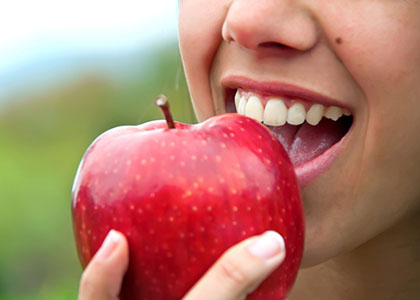
11 Non-Toxic Ways to Keep Your Mouth Healthy
By Isabel Smith, MS, RD, CDN
You may have heard your dentist talk about why your oral health is important, but do you really know why? And do you know what you should be eating and drinking to help promote a healthy mouth?
February is National Dental Health month, so we’ve got a few tips and important foods and nutrients for keeping your mouth healthy.
Your Teeth: Why They’re Important
Teeth are absolutely critical when it comes to breaking down food for digestion, and for stimulating enzyme release from the mouth for initiating carbohydrate digestion. When teeth are unhealthy and fake teeth/dentures are required, there is an increased risk for poor nutrition, as dentures don’t do nearly as good of a job when it comes to breaking down food for the digestive process.
- When you eat or drink citrus, rinse your mouth out.
Acidic foods like citrus provide health properties like vitamin C, antioxidants and anti-microbial properties, but they can also wear away at the outer layer of your teeth, called the enamel (it’s also the protective layer that helps to keep teeth healthy and prevent decay. - Cut back on sugary foods.
This is referring particularly to foods that are processed with lots of added sugars and that bacteria love to feed off of; the issue with the bacteria being attracted to the sugar is that there is a greater risk for acid production by the bacteria and greater risk for enamel erosion, which can cause cavity formation over time. - Drink more green tea.
Green tea and matcha tea contain catechins which are powerful antioxidants that have been found to help fight gum disease. - Bite into an apple.
Not just aopples, but all crunchy fruit and vegetables that you bite into like carrots, peppers, and celery help to remove plaque from teeth. - Anti-up on the antioxidants and anti-inflammatory rich foods.
Eat more color! Produce with richer color tends to have more antioxidants which help fight cellular damage. Foods that are known to be rich in anti-inflammatory properties, like these 8 anti-inflammatory foods, can help to fight inflammation not only in the gums but in the entire body. Antioxidants help to fight cellular damage and anti-inflammatory properties help to prevent inflammation that can result from damage. - Call for calcium-rich foods.
Osteoporosis is a major risk factor for declining health of teeth so eating more calcium rich-foods is important. Grab for foods like non-dairy milk, green leafy vegetables, nuts and seeds. Learn why you don’t need milk to get your calcium fix. - Add fresh cranberries to the fruit bowl.
Recent research suggests that fresh cranberries may help to reduce bacterial activity that can cause cavities over time before it starts. You can even try adding fresh cranberries to your next juice, like this Cranberry Ginger Apple Juice Recipe. - Don’t forget the folate.
Folate is a B-vitamin that plays an imperative role in red blood cell production. When it comes to teeth, it plays an important role in the health of the gum tissue and research suggest that low folate levels are often associated with gum disease. Eat more dark green leafy vegetables for folate. - Say yes to the sun.
Vitamin D plays an important role when it comes to calcium absorption for maintaining bone health. When it comes to your teeth, it has been found that vitamin D may play a role in promoting health of tooth enamel. Vitamin D is made in our bodies through sun exposure, but in many cases may require a supplement. Learn everything you need to know about Vitamin D. - Go crazy for chlorophyll-rich herbs.
If anyone experiences bad breath, this one is for you. Dark green herbs like parsley, basil, alfalfa, dill and mint can help to fight bad breath by acting as a deodorizer, absorbing the bad scents. - Fill up on fluids.
Water in particular can help keep your mouth moist which is important for helping to flush out food particles from your mouth, helping to prevent bacteria from settling in and causing cavities.